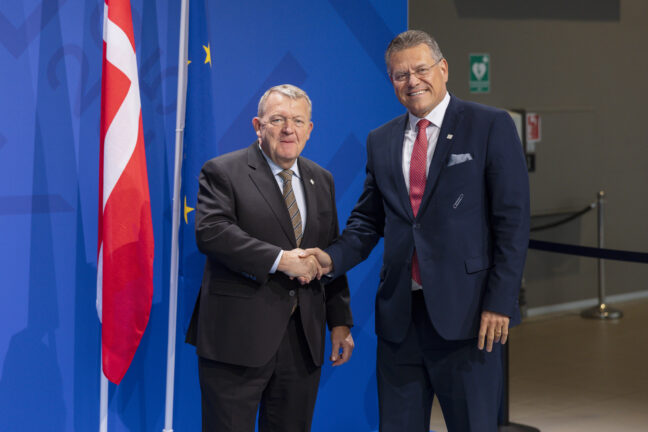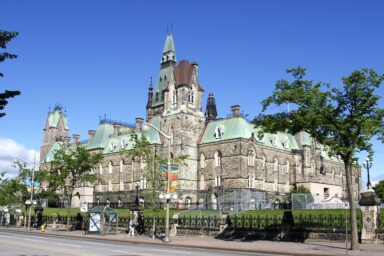EU trade ministers and the Commissioner for Trade Maroš Šefčovič met for a second day of talks in Denmark namely to tackle difficult issues related to the EU-US trade agreement and trade security. Danish Minister for Foreign Affairs, Lars Løkke Rasmussen, also welcomed WTO Director-General, Dr Ngozi Okonjo-Iweala.
Ministers addressed the recent challenges affecting the trade agreement between the European Union and the United States, focusing on advancing its implementation and further development. They also explored trade-related aspects of economic security, emphasising how the newly announced economic security doctrine can help minimise the EU’s vulnerabilities and boost its resilience. Lastly, the ministers reviewed the progress made in various bilateral trade negotiations, recognising their potential to help counteract difficulties faced by the global trading system.
Unpredictable world
Lars Løkke Rasmussen, Denmark’s Minister for Foreign Affairs made clear why security was also on the table on Tuesday.
“We are facing a more unpredictable world, we have to strike balances, we must not be naïve even though we are in favour of free trade. We have gained our prosperity from trade. We have to strike some kind of balance. I think it is about promoting, enhancing and protecting the internal market as well as then partnering up. When you are faced with obstacles it also comes with opportunities.”
While the starting point at the informal meeting was the EU’s relationship with the United States, broader trade dynamics were not far from the surface: trade deals with partners such as Mexico, Mercosur and Indonesia, as well as others under negotiation or nearing approval, such as with India, the Philippines, Thailand, Malaysia and the United Arab Emirates. These offer significant opportunities to deepen market access and strengthen economic tie. Though many underlying issues could still derail final agreements, the push to broaden markers reflect the EU’s overall strategy to diversify beyond the US and other traditional partners, promoting high standards in sustainability and digital trade while reinforcing global competitiveness. With EU exporters often facing higher production costs, reducing reliance on a single major market is no longer an option.
You might be interested
Denmark’s Lars Løkke Rasmussen, again:
“The US is only engaged in 13 per cent of global trade so we have to look at the other 87 and there are a lot of countries and regions around the world that want to engage more with the European Union (…) It’s a top priority for the Danish presidency of the EU Council to push for these negotiations.”
Focus on faithful implementation
Understandably, a lot of attention was on EU Trade Commissioner Maroš Šefčovič, one of the main negotiators of the EU-US deal. He also offered his thoughts ahead of the discussion and debate.
“From my side I would like to inform the ministers how much focus we put on the faithful implementation of the joint EU-US statement, which remains our priority and how we remain focused on the concrete outcomes of that joint statement and the overall process.”
The joint statement, agreed in August this year, forms the political basis for the current trade arrangement. Besides the agreed tariff limits, it outlines carve-outs for sectors such as pharmaceuticals, chemicals and aerospace components, where only the standard tariff applies. It also sets out plans for closer cooperation on supply chain resilience, non-tariff barriers, steel and aluminium overcapacity, and digital trade. Strategic energy cooperation and investment in critical sectors also form part of the wider deal.
Mr Šefčovič specifically referred to broadening meaningful and strategic cooperation when it came to steel, which he said had discussed with his US counterparts.
“You are all familiar with the safeguard measures we proposed last just week and how I believe that this paves the way for broader cooperation in the steel sector,” he explained.
More pronounced on security
Then he discussed the second point, on security, saying the discussion was “more pronounced” than originally expected in the face of measures taken by China. Just recently, China expanded rare earths restrictions, targeting defence and chip users. It also deepened its export control list to include a range of refining technologies, and introduced new rules requiring foreign manufacturers using its rare earths to comply, for example, with its regulatory standards. Trade Commissioner Šefčovič again:
“We already have some experience with how this export licensing in China works,” he said, underlining the fact that only half of the applications sent to Beijing has been “treated properly”.
“It makes it very difficult for planning, for business development in our companies. You know rare earth elements and permanent magnets are key elements of practically everything with any digital element in it.” The commissioner said this had aggravated the situation and that he had already discussed the issue with G7 partners. He said he expected a G7 video call follow-up.











